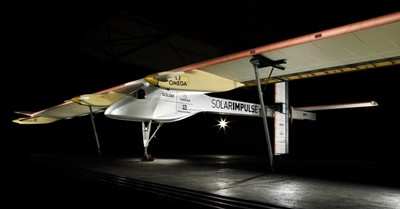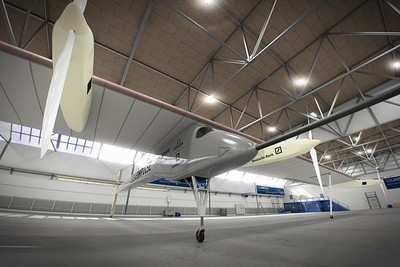Mon, Jun 13, 2011
Ambitious Flight Ran Out Of Safe Options, Made GREAT Decision
To Try Again Later
It was a good try. Bertrand Piccard and André Borschberg
were trying to head for Paris, flying the Solar Impulse, in order
to serve as a special guest of the Paris Air Show. The flight,
planned from Brussels to Paris Le Bourget, Saturday, had to turn
back half-way and land back in Brussels where it had taken off.

The weather conditions are the primary reason for returning to
Brussels. The wet and windy conditions this afternoon delayed the
HB-SIA take off until 18:36 (UTC +2) which meant it did not have
enough time in the sun to recharge its batteries. The cloud cover,
which was greater than estimated, compounded the problem, as did
the head winds and down drafts that André Borschberg
encountered underneath the cumulus clouds. The HB-SIA was forced to
fly at a lower altitude than planned and consequently used up its
batteries too quickly putting it at risk before reaching Paris.
Solar Impulse’s Flight Director, Raymond Clerc, decided to
favor safety. “It isn't really a surprise, more of an
illustration of how challenging this particular flight is. Under no
circumstances will we take a risk. We therefore decided to return
to Brussels where the technical team was awaiting the HB-SIA to
land. We hope to have a weather window soon that is long enough for
a safe flight to Paris.”

André Borschberg, CEO and co-founder of Solar Impulse,
said that, “We knew that it would be very difficult due to
our late take-off. Because of the weather, the level of charge of
the batteries went down faster than expected, and we considered
that it was safer to turn back. This setback is at the heart of
what Solar Impulse is all about. It is an experimental project and
we therefore make attempts that aren’t necessarily always
successful.”
For Bertrand Piccard, the initiator and Chairman of Solar
Impulse, “What is surprising is not so much that we had a
problem last night, but that we never had one until now. The
success of the first flights gave a wrong impression that things
were easy.”
More News
Aero Linx: Model Aeronautical Association of Australia MAAA clubs are about fun flying, camaraderie and community. For over 75 years, the MAAA has been Australia’s largest fl>[...]
Touchdown Zone Lighting Two rows of transverse light bars located symmetrically about the runway centerline normally at 100 foot intervals. The basic system extends 3,000 feet alon>[...]
“Discovery and innovation are central to our mission at Virgin Galactic. We’re excited to build on our successful record of facilitating scientific experiments in subor>[...]
How To Get A Story On Aero-TV News/Feature Programming How do I submit a story idea or lead to Aero-TV? If you would like to submit a story idea or lead, please contact Jim Campbel>[...]
Student Pilot Reported That During Rotation, “All Of A Sudden The Back Of The Plane Kicked To The Right..." Analysis: The student pilot reported that during rotation, “>[...]
 ANN's Daily Aero-Linx (05.02.24)
ANN's Daily Aero-Linx (05.02.24) ANN's Daily Aero-Term (05.02.24): Touchdown Zone Lighting
ANN's Daily Aero-Term (05.02.24): Touchdown Zone Lighting Aero-News: Quote of the Day (05.02.24)
Aero-News: Quote of the Day (05.02.24) ANN FAQ: Contributing To Aero-TV
ANN FAQ: Contributing To Aero-TV NTSB Final Report: Cirrus Design Corp SR20
NTSB Final Report: Cirrus Design Corp SR20




